I’m thrilled to share my guide on effective common cold remedies with you. If you’re fighting off cold symptoms or want to strengthen your immune system, you’re in the right spot. This article will cover various strategies, from home remedies to over-the-counter meds, to help you get over the common cold quicker and feel better sooner.
Key Takeaways
- Discover natural ways to alleviate cold symptoms and boost your immune system
- Explore over-the-counter cold medications and when to consider them
- Learn about the importance of hydration and rest for cold recovery
- Understand the differences between common cold and flu symptoms
- Gain insights on preventing future colds through proper hygiene and self-care
Understanding the Common Cold
Before we look into remedies for the common cold, let’s understand this common illness. The common cold is a viral infection that hits the upper respiratory system. It brings symptoms that can really mess up our daily routines. Knowing the symptoms, causes, and how long it lasts helps us manage it better and know when to get help.
Symptoms and Causes
The common cold shows up with symptoms like sneezing, a runny or stuffy nose, sore throat, and coughing. You might also get headaches, a mild fever, and feel pretty crummy. These symptoms are usually caused by viruses called rhinoviruses. They love the cooler parts of our upper respiratory tract.
Duration and Severity
Most common colds are pretty mild and go away in 7 to 10 days. But, how long and how bad a cold lasts can change a lot. It depends on things like your age, immune health, and the virus type. Sometimes, a cold can turn into something worse like sinus infections or bronchitis, which might need a doctor’s help.

“Understanding the common cold is the first step towards effective management and recovery.”
Boosting Your Immune System
Strengthening your immune system is a great way to fight off a cold. Adding vitamin C supplements and zinc lozenges to your daily routine can boost your body’s defense against the cold virus.
Vitamin C and Zinc Supplements
Vitamin C is known for boosting the immune system. It helps make white blood cells and antibodies. Studies show that vitamin C supplements can make cold symptoms shorter and less severe.
Zinc is key for a healthy immune system. Zinc lozenges can cut down the time you’re sick with a cold. They stop the cold virus from spreading.
Start taking these supplements when you first feel a cold coming on. Using vitamin C and zinc regularly helps your body fight the cold virus. This means you’ll recover faster and get back to your normal life sooner.

“Strengthening your immune system is one of the best ways to combat a cold. Vitamin C and zinc supplements can provide a powerful boost to your body’s natural defenses.”
While supplements are helpful, don’t forget a balanced diet and enough sleep. These support your health and immune function. A holistic approach helps your body fight off the common cold and recover faster.
Soothing Throat Remedies
When the common cold hits, a sore throat can be really annoying. Luckily, there are many ways to ease the pain. Let’s look at some top remedies to make you feel better quickly.
Throat Lozenges and Sprays
Sucking on throat lozenges can offer quick relief by coating and lubricating the throat. Choose lozenges with menthol, honey, or numbing agents to lessen pain and swelling. Throat sprays are also handy, giving you relief right where it hurts.
| Throat Remedy | Key Ingredients | Benefits |
|---|---|---|
| Throat Lozenges | Menthol, Honey, Numbing Agents | Coat and lubricate the throat, reduce pain and inflammation |
| Throat Sprays | Numbing Agents, Antiseptics | Deliver targeted relief to the throat, easy to use |
When picking throat remedies, read the labels carefully. Choose products that fit your symptoms and age. If you’re unsure, talk to a healthcare professional.
“Soothing a sore throat is essential for finding relief and getting back on the road to recovery.”
Herbal Remedies
There are also natural ways to ease a sore throat. Honey is a classic choice, thanks to its germ-fighting and swelling-reducing qualities. Ginger and chamomile teas can also offer comfort.

While these natural remedies can be helpful, always check with a healthcare provider if symptoms don’t get better. Drinking plenty of water and resting well also help your body heal.
Combating Nasal Congestion
Dealing with a stuffy, runny nose can be really frustrating, especially when you have a cold. Luckily, there are many ways to find relief and clear your nasal congestion.
Decongestants and Expectorants
Over-the-counter decongestants like pseudoephedrine or phenylephrine can help reduce nasal congestion. They work by making blood vessels smaller and shrinking swollen nasal passages. Expectorants like guaifenesin can also help by making mucus thinner and easier to clear.
It’s important to use these medications as directed and not take more than the recommended amount. Taking too much can cause side effects like a faster heart rate, dizziness, or trouble sleeping.
Humidifiers and Steam Inhalation
Using a humidifier or taking a steam inhalation is another great way to alleviate nasal congestion. Moist air can help loosen mucus and make breathing easier. Just running a warm-mist humidifier in your room or taking a hot shower can help a lot.
For even more relief, try adding a few drops of menthol or eucalyptus essential oils to your humidifier or bath water. These oils can help soothe and clear your nasal passages.
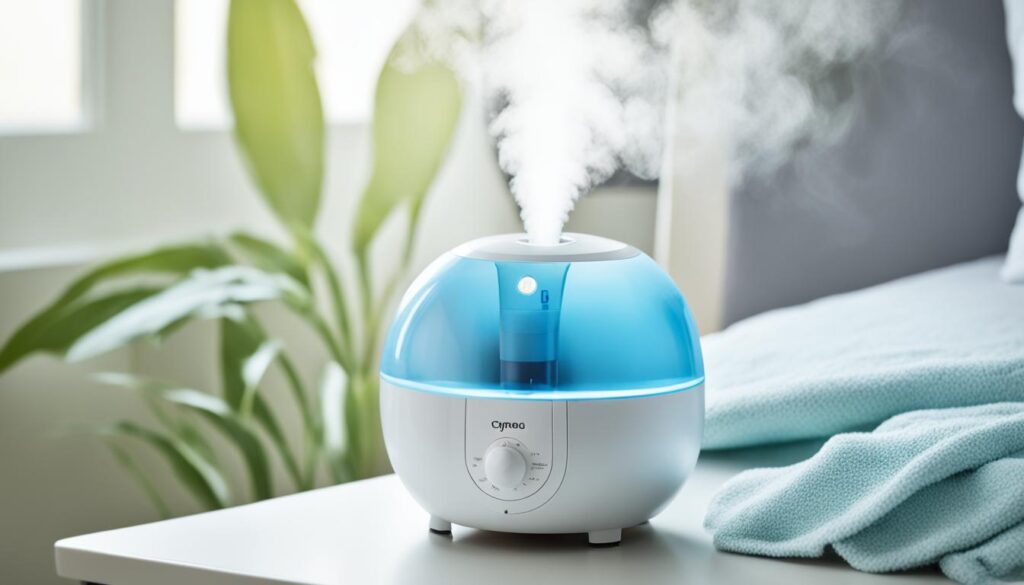
By using decongestants, expectorants, and humidifiers together, you can effectively fight nasal congestion and feel better when you have a cold.
Cough Suppressants and Fever Reducers
Dealing with a cold can be tough, especially when you’re bothered by coughing and fever. Luckily, there are over-the-counter meds to help. Let’s look at the different kinds of cough suppressants and fever reducers out there and how to use them right.
Cough Suppressants: These meds, or antitussives, lessen the need to cough. They’re great for a cough that won’t stop, keeping you awake at night. Ingredients like dextromethorphan and guaifenesin are common in cough suppressants.
Fever Reducers: These meds, or antipyretics, lower your temperature when you have a cold-related fever. Ingredients such as acetaminophen and ibuprofen are often used in fever reducers. Always follow the dosage instructions closely to avoid side effects.
When taking cough suppressants and fever reducers, watch out for interactions with other meds you might be on. It’s smart to talk to your doctor or pharmacist to make sure you’re using these cold medicines safely and right.
“Proper use of cough suppressants and fever reducers can provide much-needed relief during a cold, allowing you to rest and recover more quickly.”
These over-the-counter remedies can ease symptoms, but they don’t cure the cold virus. Using them with other steps like drinking plenty of water and resting can help you feel better and bounce back sooner.

Hydration and Rest
When you’re fighting a common cold, it’s key to drink plenty of water and get enough sleep. These two things help your body beat the virus and ease your symptoms.
Staying Hydrated
Drinking enough fluids is vital when you’re sick. It makes mucus thinner, so it’s easier to cough out. It also boosts your immune system. Try to drink at least 8 glasses of water, herbal tea, or warm broth every day.
Getting Adequate Rest
You need more sleep when you’re sick with a cold. Sleep lets your immune system work on fighting the virus. It also helps you recharge. Try to sleep 7-9 hours each night. If you’re tired, take naps during the day. And, don’t overdo it with exercise to save your energy for getting better.
By focusing on staying hydrated and getting adequate rest, you make your body a great place for common cold recovery. These easy steps can speed up your recovery and make you feel better sooner.
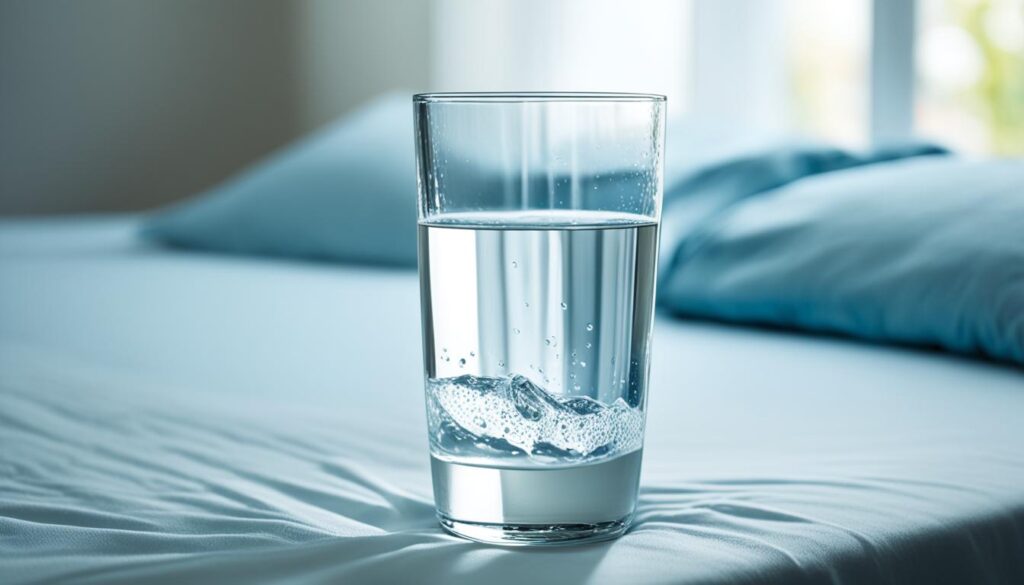
| Hydration Tips | Rest Recommendations |
|---|---|
|
|
Home Remedies for the Common Cold
Home remedies can be just as good as over-the-counter meds for cold symptoms. These natural solutions can help you feel better fast without needing prescription drugs. Let’s look at some popular and effective home remedies for the common cold.
Honey and Ginger
Honey and ginger are great for a sore throat and cough. Mix a tablespoon of honey with a teaspoon of fresh ginger in warm tea. Drink it slowly to feel the soothing effects.
Garlic and Turmeric
Garlic and turmeric are full of antibacterial and anti-inflammatory goodness. Adding them to your food or taking supplements can boost your immune system and ease cold symptoms. Try a warm turmeric latte or add garlic to your soups and stews.
Elderberry and Echinacea
Elderberry and echinacea have been fighting viral infections for centuries. You can find them as teas, syrups, or supplements. Add them to your daily routine during cold and flu season.
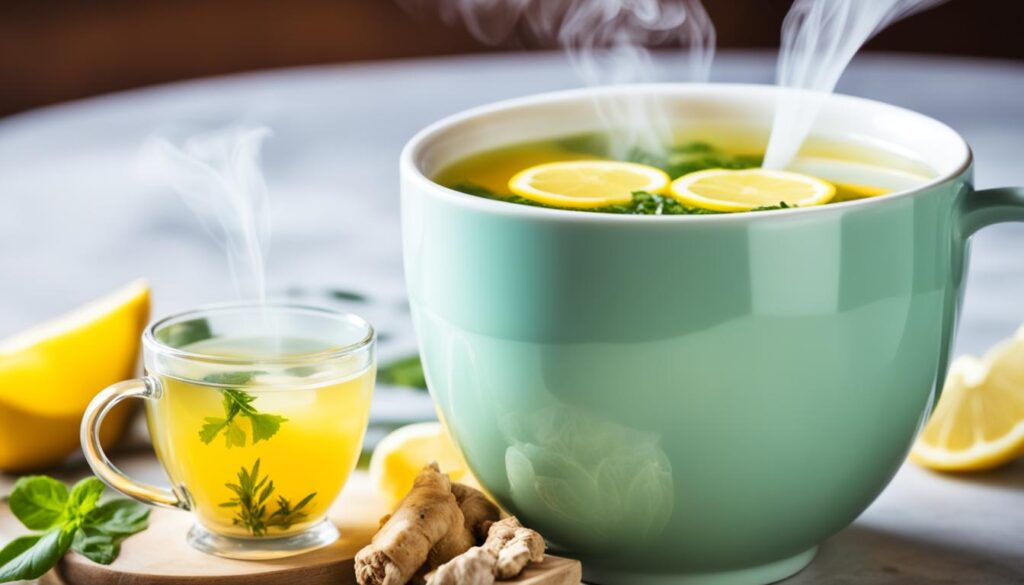
While these home remedies can help with cold symptoms, see a healthcare professional if things get worse or last over two weeks. Sometimes, you’ll also need rest, plenty of water, and over-the-counter meds.
When to Seek Medical Attention
Most common colds can be treated at home. But, there are times when you should see a doctor. Knowing when to get medical help ensures you get the right treatment and prevents things from getting worse.
Here are some cold symptoms that require medical care:
- Persistent or severe sore throat that makes it difficult to swallow
- Fever higher than 101°F (38.3°C) that lasts more than three days
- Severe or persistent chest pain or discomfort
- Wheezing or difficulty breathing
- Symptoms that worsen or fail to improve after 10 days
If you notice any of these signs it’s time to see a doctor for a cold, make an appointment. Getting medical help can rule out serious conditions. It ensures you get the right treatment to ease your symptoms and recover faster.
“When in doubt, it’s always better to err on the side of caution and consult a healthcare professional.”
Knowing which cold symptoms need medical care helps you manage your health better. This way, you can recover faster and feel better sooner.
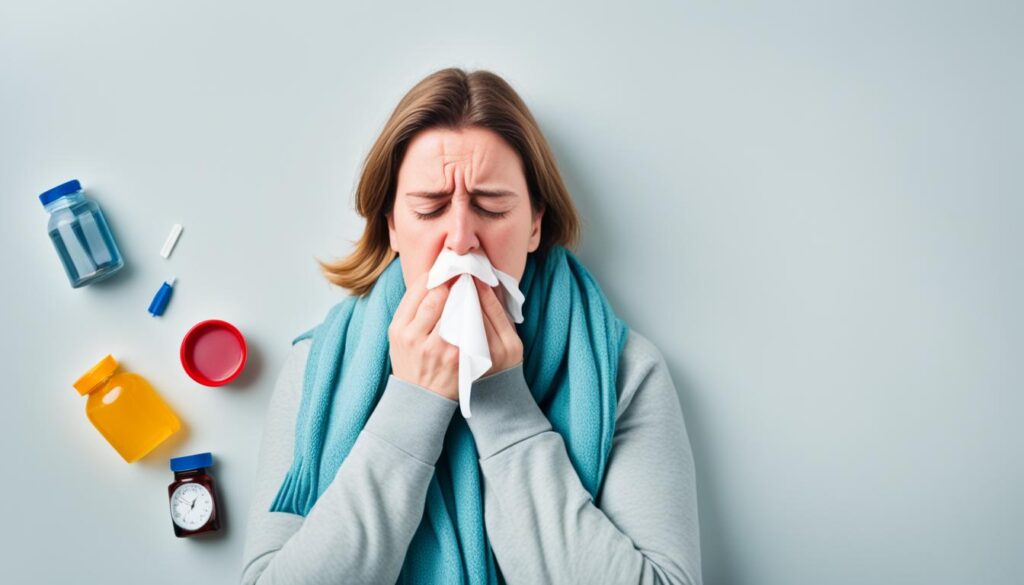
Preventing Future Colds
Treating your current cold is key, but preventing future ones is just as important. One top way to lower your risk is through proper handwashing and good hygiene.
Handwashing and Hygiene
Handwashing often is a simple yet powerful way to stop cold germs from spreading. The CDC says to wash your hands with soap and water for at least 20 seconds. Do this after blowing your nose, coughing, or sneezing.
- Wet your hands with clean, running water and apply soap.
- Lather your hands by rubbing them together with the soap, making sure to scrub the backs of your hands, between your fingers, and under your nails.
- Scrub your hands for at least 20 seconds.
- Rinse your hands under clean, running water.
- Dry your hands using a clean towel or air dry them.
Good hygiene is also key to avoiding colds. This means:
- Avoiding touching your face, especially your eyes, nose, and mouth, as these are common entry points for cold-causing viruses.
- Covering your coughs and sneezes with a tissue or the inside of your elbow to prevent the spread of germs.
- Disinfecting frequently touched surfaces, such as doorknobs, keyboards, and phones, to eliminate potential sources of cold-causing viruses.
By focusing on handwashing and good hygiene, you can greatly lower your chance of getting a cold. This also helps stop the spread of illness to others.

| Handwashing Steps | Tips for Good Hygiene |
|---|---|
|
|
“Handwashing is one of the most effective ways to prevent the spread of germs and reduce the risk of catching the common cold.”
Over-the-Counter Medications
Over-the-counter (OTC) medications can help fight the common cold. They offer relief for symptoms like nasal congestion and coughs. These medicines are easy to find and can make you feel better.
Decongestants are a common type of OTC cold remedy. They shrink the blood vessels in your nose, making it easier to breathe. You can find decongestants as pills or sprays.
Cough suppressants are another type of OTC cold medicine. They stop the coughing reflex, giving relief to those with a bad cough. You can take cough syrups or lozenges for this.
When picking over-the-counter cold medicines, read the labels carefully. Follow the dosage instructions. Some medicines also have pain relievers or fever reducers, so watch out for side effects.
| OTC Cold Medicine | Active Ingredient | Purpose |
|---|---|---|
| Sudafed | Pseudoephedrine | Decongestant |
| Robitussin | Dextromethorphan | Cough Suppressant |
| Tylenol Cold | Acetaminophen, Phenylephrine | Pain Reliever, Decongestant |
Remember, OTC cold medicines only offer temporary relief. They shouldn’t replace rest, staying hydrated, or boosting your immune system. Always talk to a healthcare professional if your symptoms get worse or don’t go away.
Natural and Herbal Remedies
There are many natural and herbal options to help with common cold symptoms. Let’s look at honey, ginger, elderberry, and echinacea as possible natural cold remedies.
Honey and Ginger
Honey is a classic natural remedy for soothing sore throats and coughs from the common cold. It might have antimicrobial and anti-inflammatory effects to ease cold symptoms. Ginger is great for reducing inflammation and clearing congestion. Mixing honey and ginger in a warm tea or lozenge can make a soothing treatment for colds.
Elderberry and Echinacea
Elderberry is full of antioxidants and has been used to boost the immune system and ease cold symptoms. Some studies show elderberry might cut down the length and severity of colds. Echinacea, a well-known herbal remedy, is thought to boost the immune system and might shorten colds. Even though the science is not all clear, many people find echinacea helpful in fighting colds.
| Natural Remedy | Potential Benefits |
|---|---|
| Honey | Antimicrobial and anti-inflammatory properties, soothes sore throats and coughs |
| Ginger | Reduces inflammation and eases congestion |
| Elderberry | Rich in antioxidants, supports the immune system, may reduce cold duration and severity |
| Echinacea | Stimulates the immune system, potentially shortens cold duration |
These natural and herbal remedies look promising, but remember, the science is still growing. Always talk to a healthcare professional before trying new supplements or remedies, especially if you have health issues or are on medication.
Cold Remedies for Children
Dealing with a child’s cold can be tough. Their systems need special care when fighting colds. Here, I’ll share safe and effective ways to help your child feel better. You’ll find tips on how to make them more comfortable and dosage info for treatments.
Symptom Management for Little Ones
When a child gets a cold, we aim to ease their pain and let their immune system work. Cold remedies for kids should be soft and fit their needs. Over-the-counter meds like children’s cold treatment can lessen fever, clear noses, and soothe sore throats. But, it’s key to follow the dosage rules closely.
- Decongestants can clear up stuffy noses but should be used carefully in young kids.
- Cough suppressants can ease coughs, but always check with a pediatrician first. Coughing helps clear out mucus.
- Fever reducers like acetaminophen or ibuprofen can make kids feel better. But remember, fever shows the body is fighting an infection.
Other cold remedies for kids include:
- Saline nasal drops or sprays to loosen mucus
- Honey (for kids over 1 year old) to soothe coughs and sore throats
- Humidifiers to add moisture and ease breathing
Keep an eye on your child’s symptoms and talk to a pediatrician if the cold doesn’t get better or gets worse. With the right cold treatment for children, your child can feel better and get over it faster.
Managing Cold Symptoms at Work or School
Dealing with a cold while working or going to school can be tough. But, you can still manage your symptoms and stay on top of things. Here are some tips to help you make it through the day when you’re not feeling well.
Stay Hydrated
It’s key to stay hydrated when you have a cold. Drink lots of fluids like water, herbal tea, or warm broth. This helps thin out mucus and keeps you from getting dehydrated. Stay away from caffeinated drinks as they can dry you out.
Take Breaks
Listen to your body and take breaks when you need them. If you’re feeling really tired or stuffed up, step away for a few minutes. Use this time to breathe deeply or put a warm compress on your face.
Dress Comfortably
Wear loose, comfy clothes that don’t make you feel tight. This makes you feel better and helps you focus on your work or studies.
Prioritize Tasks
When you’re not feeling great, focus on the most important tasks first. Save the less important ones for when you’re feeling better. This keeps you on track and prevents burnout.
Communicate with Colleagues or Instructors
Tell your boss, coworkers, or teachers you’re sick. They might understand and offer help, like letting you work from home or take a day off to rest.
| Managing Colds at Work | Managing Colds at School |
|---|---|
|
|
By using these tips, you can better manage your cold symptoms and stay productive, whether you’re at work or in school.
“Taking care of yourself when you’re sick is important for your overall health and well-being, both in the short and long term.”
Conclusion
We’ve looked into many ways to beat the common cold. We’ve learned about symptoms and how to boost our immune system. Using vitamin C, zinc, and treatments for sore throats helps us recover faster.
Decongestants, humidifiers, and steam inhalation help with stuffy noses. Cough medicines and fever reducers ease the cold’s worst symptoms. Drinking plenty of water and resting well are key to getting better quickly.
Choosing between medicines or natural remedies like honey, ginger, and elderberry is important. It’s about listening to what our bodies need. By washing our hands well and staying clean, we can avoid getting colds and keep our health strong.


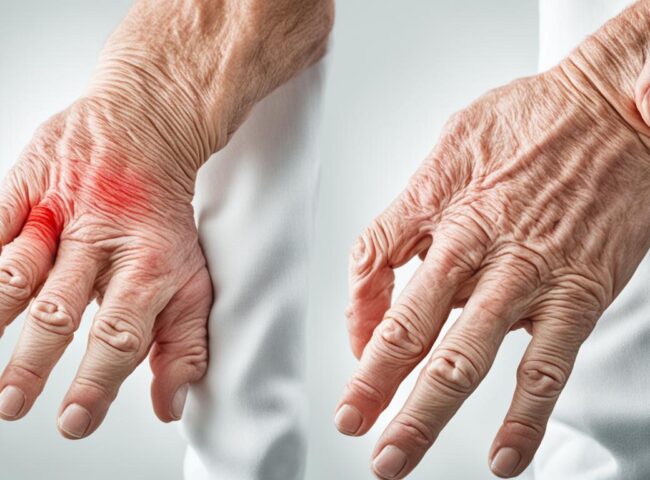
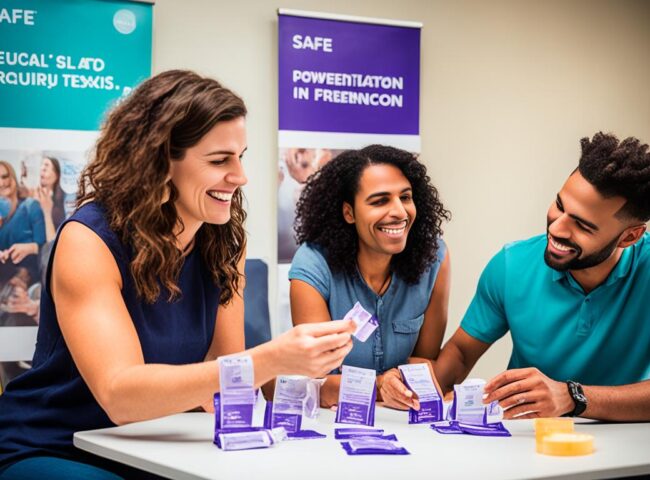



Leave feedback about this